- Home
- Robert B. Parker
God Save the Child s-2
God Save the Child s-2 Read online
God Save the Child
( Spenser - 2 )
Robert B Parker
God Save the Child
(Spenser 02)
By
Robert B. Parker
This is for My Mother and Father
Chapter 1
If you leaned way back in the chair and cranked your neck hard over, you could see the sky from my office window, delft-blue and cloudless and so bright it looked solid. It was September after Labor Day, and somewhere the corn was probably as high as an elephant’s eye, the kind of weather when a wino could sleep warm in a doorway.
“Mr. Spenser; are you listening to us?”
I straightened my head up and looked back at Roger and Margery Bartlett.
“Yes, ma’am,” I said. “You were just saying about how you never dealt with a private detective before, but this was an extreme case and there seemed no other avenue.
Everybody who comes in here tends to say about that same thing to me.”
“Well it’s true.” She was probably older than she looked and not as heavy. Her legs were very slim, the kind women admire and men don’t. They made her plumpish upper body look heavier Her face had a bland, spoiled, pretty look, carefully made up with eye shadow and pancake makeup and false eyelashes. She looked as though if she cried she’d erode. Her hair, freshly blond, was cut close around her face. Gaminelike, I bet her hairdresser said. Mia Farrow, I bet he said. She was wearing a paisley caftan slit up the side and black, ankle-strapped platform shoes with three-inch soles and heels. Sitting opposite me, she had crossed her legs carefully so that the caftan fell away above the knee. I wanted to say, don’t, your legs are too thin. But I knew she wouldn’t believe me. She thought they were wonderful.
Just below her rib cage I could see the little bulge where her girdle stopped and the compressed flesh spilled over the top. She was wearing huge lavender sunglasses and lavender-dyed wooden beads on a leather thong. Authentic folk art, picked them up in Morocco on our last long weekend, the naivete is charming, don’t you think?
“We want you to find our son,” she said.
“Okay.”
“He’s been gone a week. He ran away.”
“Do you know where he might have run?” I asked.
“No,” her husband answered. “I looked everywhere I could think of—friends, relatives, places he might hang out. I’ve asked everyone I know that knows him. He’s gone.”
“Have you notified the police?”
They both nodded. Mr. Bartlett said, “I talked to the chief myself. He says they’ll do what they can, but of course it’s a small force and there isn’t much…”
He let his voice trail off and sat still and uncomfortable looking at me. He looked ill at ease in a shirt and tie. He was dressed in what must have been his wife’s idea of the contemporary look. You can usually tell when a guy’s wife buys his clothes. He had on baggy white cuffed flares, a solid scarlet shirt with long collar points, a wide pink tie, and a red-and-white-plaid seersucker jacket with wide lapels and the waist nipped. A prefolded handkerchief in his breast pocket matched the tie. He had on black and white saddle shoes and looked as happy as a hound in a doggie sweater. He should have been wearing coveralls and steel-toed work shoes. His hands looked strong and caloused, the nails were broken, and there was grime imbedded that the shower wouldn’t touch.
“Why did he run away?” I asked.
“I don’t know,” Mrs. Bartlett answered. “He isn’t a happy boy; he’s going through some adolescent phase, I guess. Stays in his room most of the time. His grades are falling off. He used to get very good grades. He’s very bright, you know.”
“Why are you sure he ran away?” I didn’t like asking the question.
Mr. Bartlett answered, “He took his guinea pig with him.
Apparently he came home from school to get it and left.”
“Did anyone see him leave?”
“No.”
“Was anyone home when he came home?”
“No. I was at work and she was at her acting lessons.”
“I take my acting lessons twice a week. In the afternoons.
It’s the only time I can get them. I’m a very creative person, you know, and I have to express myself.”
Her husband said something that sounded like “umph.”
“Besides,” she said, “what has that got to do with anything? Are you saying if I’d been home he wouldn’t have run off?. Because that simply isn’t so. Roger is hardly perfect, you know.”
“I was asking because I was trying to find out if he snuck in and out or not. It might suggest whether he intended to run off when he came home.”
“If I didn’t express myself, I couldn’t be as good a mother and wife. I do it for my family, mainly.”
Roger looked like he’d just bitten his tongue.
“Okay,” I said.
“Creative people simply must create. If you’re not a creative person, you wouldn’t understand.”
“I know,” I said. “I have the same damned problem.
Right now for instance, I’m trying to create some information, and, for heaven’s sake, I’m not getting anywhere at all.”
Her husband said, “Yeah, will you for crissake, Marge, stop talking about yourself?”
She looked a little puzzled, but she shut up.
“Did the boy take anything besides the guinea pig?” I asked.
“No.”
“Has he ever run away before?”
There was a long pause while they looked at each other.
Then, like the punch line in a Frick-and-Frack routine, she said yes and he said no.
“That covers most of the possibilities,” I said.
“He didn’t really run away,” Bartlett said. “He just slept over a friend’s house without telling us. Any kid’ll do that.”
“He did not; he ran away,” his wife said. She was intense and forgot about displaying her legs—the skin slid over as she leaned forward and covered them entirely. “We called everywhere the next day, and Jimmy Houser’s mother told us he’d been there. If you hadn’t gone and got him at school, I don’t think he’d have come back.”
“Aw Marge, you make everything sound like a goddamned drama.”
“Roger, there’s something wrong with that kid, and you won’t admit it. If you’d gone along with it when I wanted him looked at—but no, you were so worried about the money. ‘Where am I going to get the money, Marge, do you think I’ve got a money tree in back, Marge?” If you’d let me take him someplace, he’d be home now.“
The mimicry sounded true. Bartlett’s tan face got darker.
”You bitch,“ he said. ”I told you, take the money out of your goddamned acting lessons and your goddamned pottery classes and your goddamned sculpturing supplies and your goddamned clothes. You got twenty years psychology payments hanging in your goddamned closet…“
I was going to get a chance to check my erosion theory.
Tears began to well up in her eyes, and I found I didn’t want to check my theory nor did I want to see her erode. I put my fingers in my ears and waited.
They stopped.
”Good,“ I said. ”Now, let us establish some ground rules. One, I am not on the Parent-of-the-Year committee. I am not interested in assessing your performance. Yell at each other when I’m not around. Second, I am a simple person. If I’m looking for a lost kid, that’s what I do. I don’t referee marriages; I don’t act as creative consultant to the Rog and Margie show. I just keep looking for the kid until I find him. Third, I charge one hundred dollars a day plus whatever expenses I incur. Fourth, I need five hundred dollars as a retainer.“
They were silent, embarrassed at the spillover
I’d witnessed.
Bartlett said, ”Yeah, sure, that’s okay, I mean hey, it’s only money, right? I’ll give you a check now; I brought one with me, in case, you know?“
He hunched the chair forward and wrote a check on the edge of my desk with a translucent ballpoint pen. Bartlett Construction was imprinted in the upper left corner of the check—I was going to be a business expense. Deductible.
One keg of 8d nails, 500 feet of 2 x 4 utility grade, one gumshoe, 100 gallons of creosote stain. I took the check without looking at it and slipped it folded into my shirt pocket, casual, like I got them all the time and it was just something to pass along to my broker. Or maybe I’d buy some orchids with it.
”What is your first step?“ Mrs. Bartlett said.
”I’ll drive up to Smithfield after lunch and look at your house and look at his room and talk to teachers and the local fuzz and like that.“
”But the police have done that. What can you do that they can’t?“ I wondered if I was cutting into her modern dance lessons.
”I can’t do anything they can’t, but I can do it full time.
They have to arrest drunks and flag down speeders and break up fights at the high school and keep the kids from planting pot in the village watering through. I don’t. All I have to do is look for your kid. Also, maybe I’m smarter than they are.“
”But can you find him?“
”I can find him; he’s somewhere. I’ll keep looking till I do.“
They didn’t look reassured. Maybe it was my office. If I was so good at finding things, how come I couldn’t find a better office? Maybe I wasn’t all that good? Maybe nobody is. I stood up.
”I’ll see you this afternoon,“ I said. They agreed and left. I watched them from my window as they left the building and headed up Stuart Street toward the parking lot next to Jake Wirth’s. An old drunk man with a long overcoat buttoned to his chin said something to them. They stared rigidly past him without answering and disappeared into the parking lot. Well, I thought, the rents are low. The old man stumbled on toward the corner of Tremont. He stopped and spoke to two hookers in hot pants and fancy hats. One of them gave him something, and he shuffled along. A blue Dodge Club van pulled out of the parking lot and headed down Stuart toward Kneeland Street and the expressway.
On the side it said Bartlett Construction. I could see one arm in the sleeve of a paisley caftan on the window as it went by.
Chapter 2
I drove north out of Boston over the Mystic River Bridge with the top down on my car. On the right was Old Ironsides at berth in the Navy Yard and to the left of the bridge the Bunker Hill Monument. Between them stretch three-decker tenements alternating with modular urban renewal units.
One of the real triumphs of prefab design is to create a sense of nostalgia for slums. At the top of the bridge I paid my toll to a man who took pride in his work. There was a kind of precise flourish to the way he took my quarter and gave me back a dime with the same hand.
Out to the right now was the harbor and the harbor islands and the long curving waterfront. The steeple of the Old North Church poked up among the warehouses and lofts.
On the East Boston side of the harbor was Logan Airport and beyond, northeast, the contours of the coast. The brick and asphalt and neon were blurred by distance and sunshine, and beneath it I got a sense of the land as it once must have been. The silent midsummer buzz of it and copper-colored near-naked men moving along a narrow trail.
The bridge dipped down into Chelsea and the Northeast Expressway. Across the other lane beyond a football field was a Colonel Sanders’ fast-food restaurant. The brick and asphalt and neon were no longer blurred, and the sense of the land went away. The expressway connects in Saugus to Route 1 and for the next ten miles is a plastic canyon of sub-sandwich shops, discount houses, gas stations, supermarkets, neocolonial furniture shops (vinyl siding and chintz curtains), fried chicken, big beef sandwiches, hot dogs cooked in beer, quarter-pound hamburgers, pizzas, storm doors, Sears, Roebuck and Co., doughnut shops, stockade fencing—preassembled sections, restaurants that look like log cabins, restaurants that look like sailing ships, restaurants that look like Moorish town houses, restaurants that look like car washes, car washes, shopping centers, a fish market, a skimobile shop, an automotive accessory shop, liquor stores, a delicatessen in three clashing colors, a motel with an in-room steam bath, a motel with a relaxing vibrator bed, a car dealer, an indoor skating rink attractively done in brick and corrugated plastic, a trailer park, another motel composed of individual cabins, an automobile dealership attractively done in glass and corrugated plastic, an enormous steak house with life-sized plastic cows grazing out front in the shadow of a six-story neon cactus, a seat cover store, a discount clothing warehouse, an Italian restaurant with a leaning tower attached to it. Overpasses punctuate Route 1, tying together the north suburban towns that line it like culverts over a sewer of commerce. Maybe Squanto had made a mistake.
A sign said Entering Smithfield, and the land reappeared.
There was grass along the highway and maple trees behind it and glimpses of lake through the trees. I turned off at an exit marked Smithfield and drove toward the center of town beneath a tunnel of elm trees that were as old as the town.
They bordered the broad street and interlaced thirty feet above it so that the sun shone through in mottled patterns on the street. Bordering the street behind big lawns and flowering shrubs were spacious old houses in shingle or clapboard, often with slate roofs, occasionally with small barns that had been converted to garages. Stone walls, rose bushes, red doors with bull’s-eye glass windows, a lot of station wagons, most of them with the fake wood on the sides. I was more aware than I had been of the big dent on the side of my car and the tear in the upholstery that I had patched with gray tape.
In the center of town was a common with a two-story white clapboard meeting house in the middle. The date on it was 1681. Across the street was a white spired church with a big church hall attached and next to that a new white clapboard library designed in harmony with the meeting-house and church. On a stone wall across from the common six teenage kids, four boys and two girls, sat swinging their bare feet and smoking. They were long-haired and T-shirred and tan. I turned right onto Main Street at the end of the common and then left. A discreet white sign with black printing on it was set in a low curving brick wall. It said Apple Knoll.
It was a development. Flossy and fancy and a hundred thousand a house, but a development. Some of the trees had been left and the streets curved gently and the lawns were well landscaped, but all the homes were the same age and bore the mark of a central intelligence. They were big colonial houses, some garrisoned, some with breezeways, some with peaked and some with gambrel roofs, but basically the same house. Eight or ten rooms, they looked to be, on an acre of land. Behind the houses on my right the land sloped down to a lake that brightened through the trees here and there where the road bent closer.
The Bartletts’ home was yellow with dark green shutters and a hip roof. The roof was slate, and there were A-shaped dormers protruding from it to suggest a third floor that was more than attic. Doubtless for the servants: they don’t mind the heat under the eaves; they’re used to it.
A brick walk led up to a wide green front door with sidelights. The brick driveway went parallel to the house and curved right, ending in a turnaround before a small barn designed like the house and done in the same colors. The blue van was there and a Ford Country Squire and a red Mustang convertible with a white roof and a black Chevrolet sedan with a buggy-whip antenna and no markings on the side.
The barn doors were open and swallows flew in and out in sharp, graceful sweeps. Behind the house was a square swimming pool surrounded by a brick patio. The blue lining of the pool made the water look artificial. Beyond the pool a young girl was operating a ride-around lawn mower I parked next to the black Chevy, up against the hydrangea bushes that lined the turnaround and concealed it from the street.
Black-and-yellow bumblebees buzzed frantically at the flowers. As I approached the house, a Labrador retriever looked at me without raising his head from his paws, and I had to walk around him to get to the back door. Somewhere out of sight I could hear an air conditioner droning, and I was conscious of how my shirt stuck to my back under my coat. I was wearing a white linen sport coat in honor of my trip to the subs, and I wished I could take it off. But since I’d made some people in the mob mad at me, I’d taken to wearing a gun everywhere, and Smithfield didn’t seem like the kind of place where you flashed it around.
Besides the white linen jacket, I had on a red checkered sport shirt, dark blue slacks, and white loafers, Me and Betsy Ross. I was neat clean, alert, and going to the back door. I rang the bell. Ding-dong, private eye calling.
Roger Bartlett came to the door looking more comfortable but no happier than when I’d last seen him. He had on blue sneakers and Bermuda shorts and a white sleeveless undershirt. He had a glass of what looked like gin and tonic in his hand and, from the smell of his breath, several more in his stomach.
”C’mon in, c’mon in,“ he said. ”How about something to fight the heat, maybe a cold one or two, a little schnapps?
Hey, why not?“ He made a two-inch measuring gesture with his thumb and forefinger as he backed into the kitchen, and I followed. It was a huge kitchen with a big maple-stained trestle table in the bay of the back windows. A cop was sitting at the table with Margery Bartlett, drinking a sixteen-ounce can of Narragansett beer. He had a lot of gold braid on his shoulders and sleeves and more on the visored cap that lay beside him on the table. He had a pearl-handled forty-five in a black holster on a Sam Browne belt. The belt made a gully in his big stomach and the short-sleeved dark blue uniform shirt. stretched very tight across his back. It was soaked with sweat around the armpits and along the spine. His bare arms were sunburned and almost hairless, and his big round face was fiery red with pale circles around his eyes where his sunglasses protected him. He’d recently had a haircut, and a white line circled each ear. His eyes were very pale blue and quite small, and he had hardly any neck, his head seeming to grow out of his shoulders. He took a long pull on the beer and belched softly.

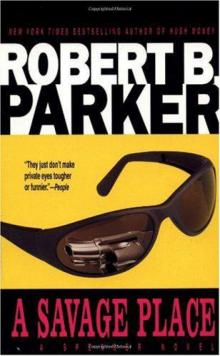 A Savage Place s-8
A Savage Place s-8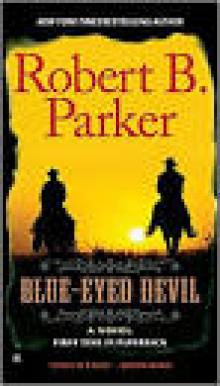 Appaloosa / Resolution / Brimstone / Blue-Eyed Devil
Appaloosa / Resolution / Brimstone / Blue-Eyed Devil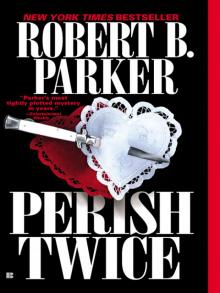 Perish Twice
Perish Twice Spare Change
Spare Change Family Honor
Family Honor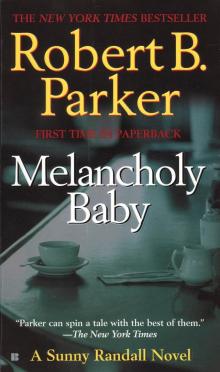 Melancholy Baby
Melancholy Baby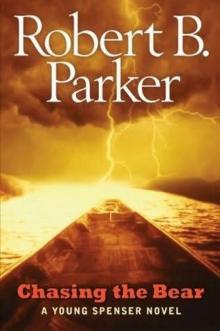 Chasing the Bear
Chasing the Bear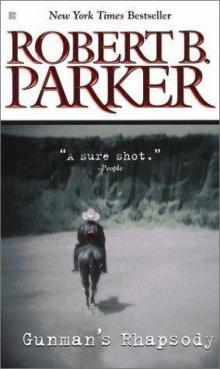 Gunman's Rhapsody
Gunman's Rhapsody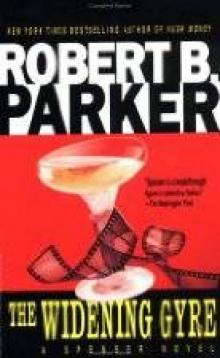 The Widening Gyre
The Widening Gyre Thin Air
Thin Air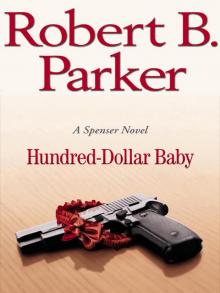 Hundred-Dollar Baby
Hundred-Dollar Baby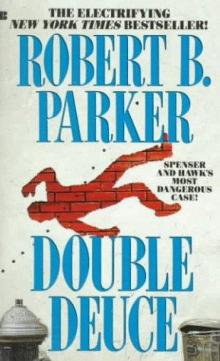 Double Deuce s-19
Double Deuce s-19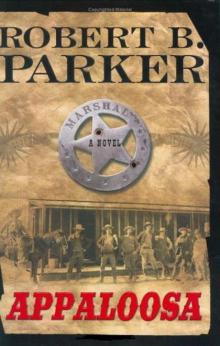 Appaloosa vcaeh-1
Appaloosa vcaeh-1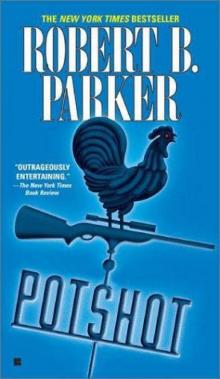 Potshot
Potshot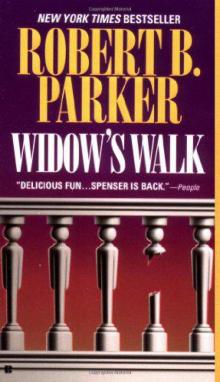 Widow’s Walk s-29
Widow’s Walk s-29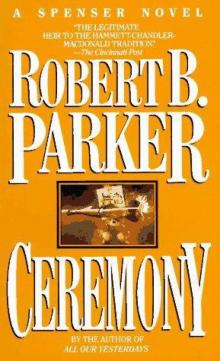 Ceremony s-9
Ceremony s-9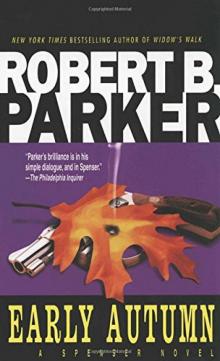 Early Autumn
Early Autumn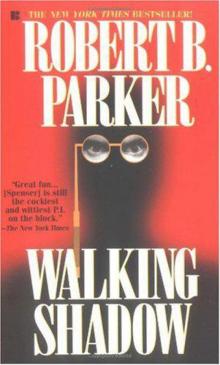 Walking Shadow s-21
Walking Shadow s-21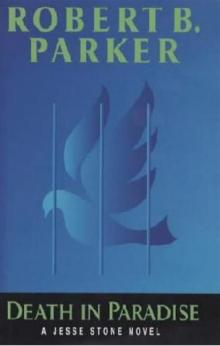 Death In Paradise js-3
Death In Paradise js-3 Shrink Rap
Shrink Rap Blue-Eyed Devil
Blue-Eyed Devil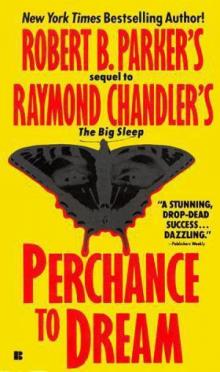 Perchance to Dream
Perchance to Dream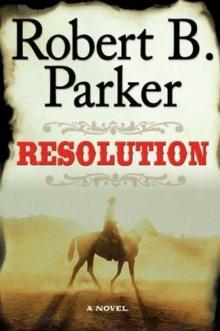 Resolution vcaeh-2
Resolution vcaeh-2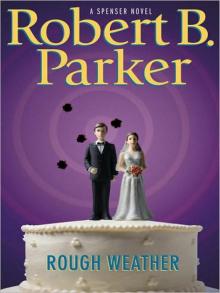 Rough Weather
Rough Weather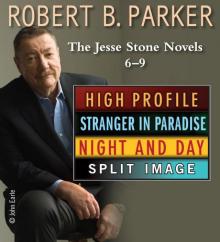 The Jesse Stone Novels 6-9
The Jesse Stone Novels 6-9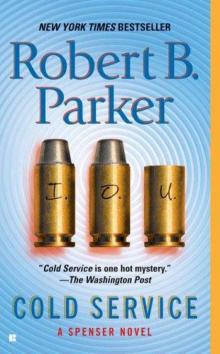 Cold Service s-32
Cold Service s-32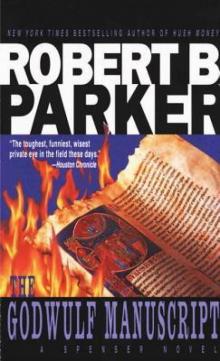 The Godwulf Manuscript
The Godwulf Manuscript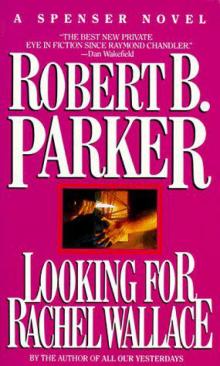 Looking for Rachel Wallace s-6
Looking for Rachel Wallace s-6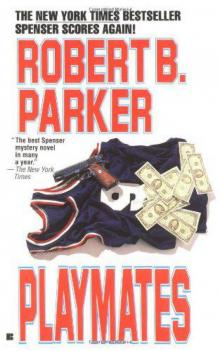 Playmates s-16
Playmates s-16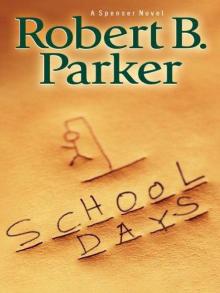 School Days s-33
School Days s-33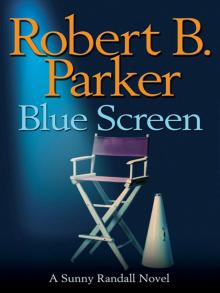 Blue Screen
Blue Screen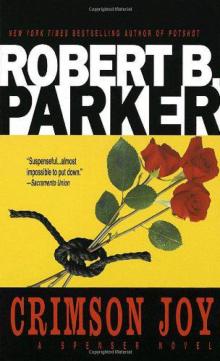 Crimson Joy
Crimson Joy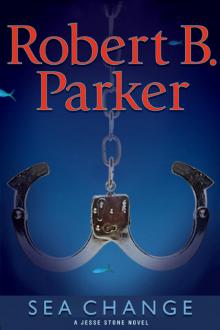 Sea Change js-5
Sea Change js-5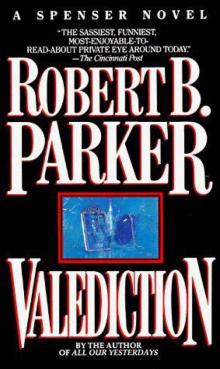 Valediction s-11
Valediction s-11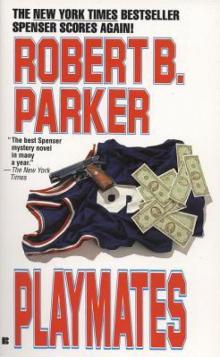 Playmates
Playmates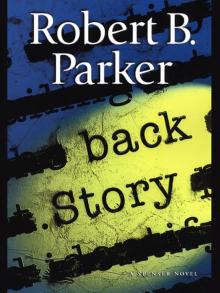 Back Story
Back Story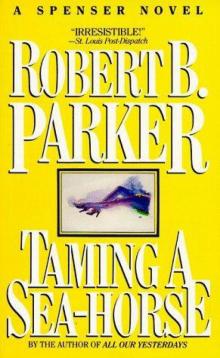 Taming a Sea Horse
Taming a Sea Horse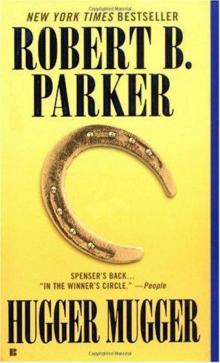 Hugger Mugger
Hugger Mugger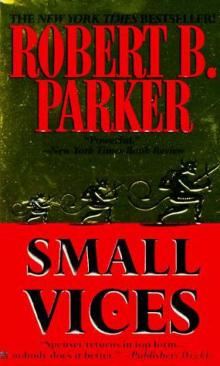 Small Vices s-24
Small Vices s-24 Silent Night: A Spenser Holiday Novel
Silent Night: A Spenser Holiday Novel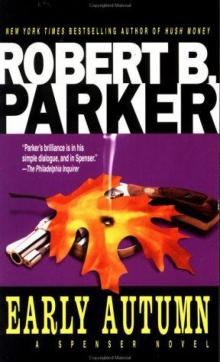 Early Autumn s-7
Early Autumn s-7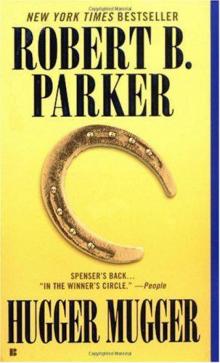 Hugger Mugger s-27
Hugger Mugger s-27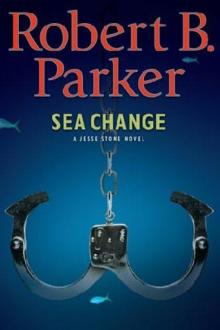 (5/10) Sea Change
(5/10) Sea Change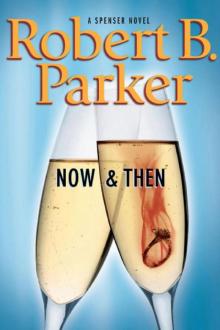 Now and Then
Now and Then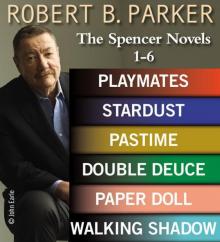 Robert B. Parker: The Spencer Novels 1?6
Robert B. Parker: The Spencer Novels 1?6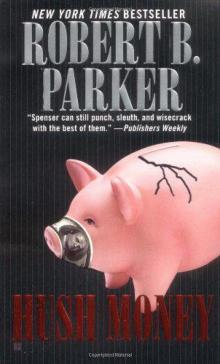 Hush Money s-26
Hush Money s-26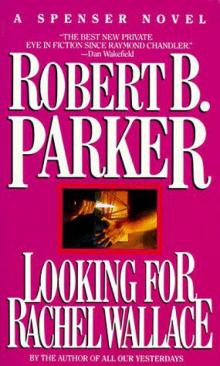 Looking for Rachel Wallace
Looking for Rachel Wallace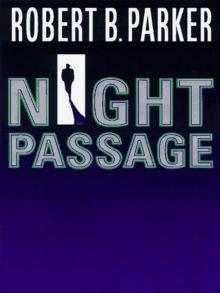 Night Passage
Night Passage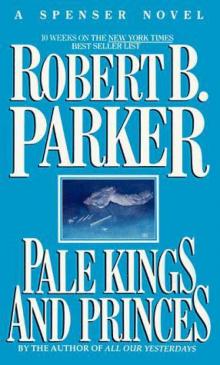 Pale Kings and Princes
Pale Kings and Princes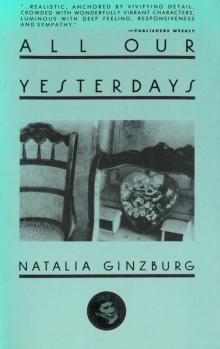 All Our Yesterdays
All Our Yesterdays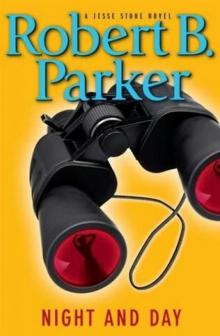 Night and Day js-8
Night and Day js-8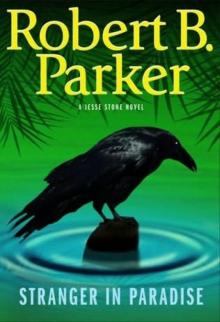 Stranger in Paradise js-7
Stranger in Paradise js-7 Double Play
Double Play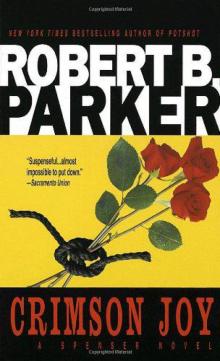 Crimson Joy s-15
Crimson Joy s-15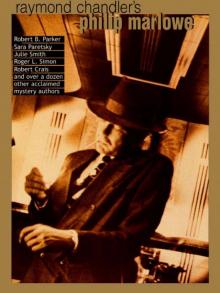 Raymond Chandler's Philip Marlowe
Raymond Chandler's Philip Marlowe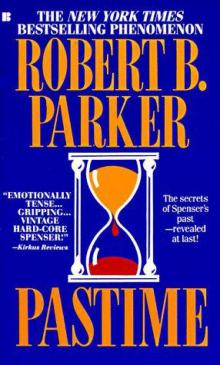 Pastime
Pastime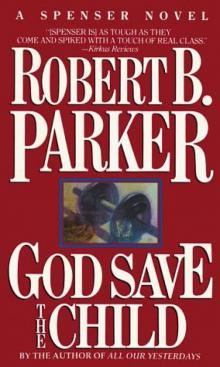 God Save the Child s-2
God Save the Child s-2 Bad Business
Bad Business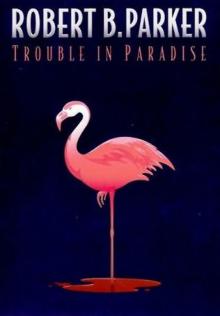 Trouble in Paradise js-2
Trouble in Paradise js-2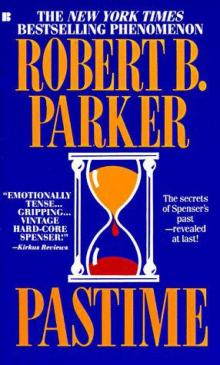 Pastime s-18
Pastime s-18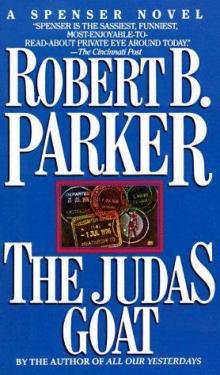 The Judas Goat s-5
The Judas Goat s-5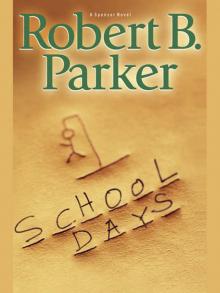 School Days
School Days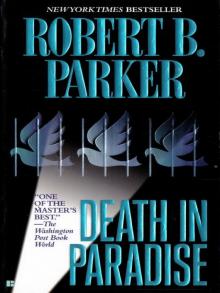 Death In Paradise
Death In Paradise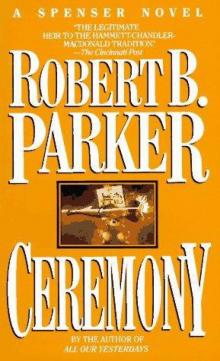 Ceremony
Ceremony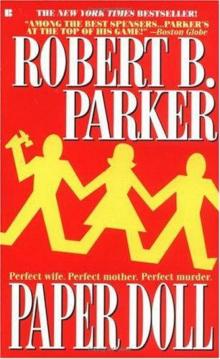 Paper Doll s-20
Paper Doll s-20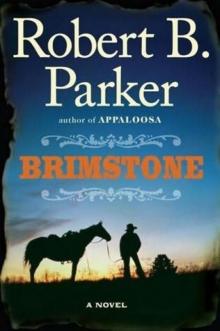 Brimstone vcaeh-3
Brimstone vcaeh-3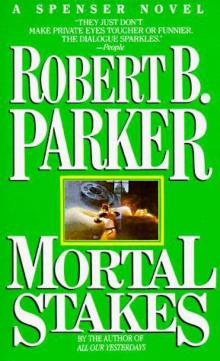 Mortal Stakes s-3
Mortal Stakes s-3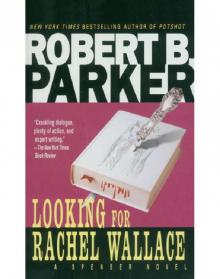 Spencer 06 - Looking for Rachel Wallace
Spencer 06 - Looking for Rachel Wallace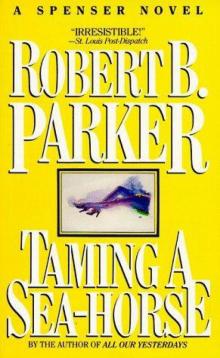 Taming a Sea Horse s-13
Taming a Sea Horse s-13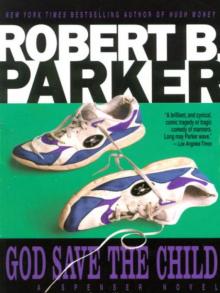 God Save the Child
God Save the Child Chance
Chance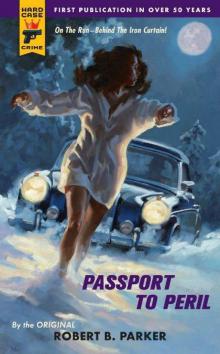 Passport To Peril hcc-57
Passport To Peril hcc-57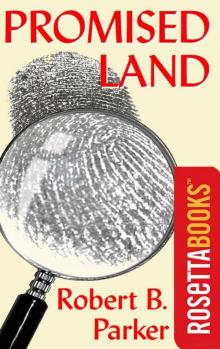 Promised Land
Promised Land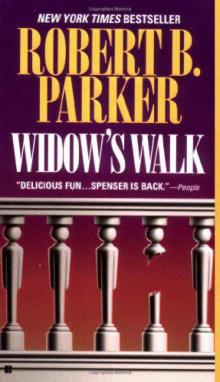 Widow’s Walk
Widow’s Walk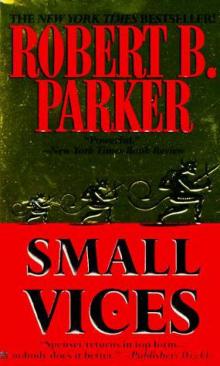 Small Vices
Small Vices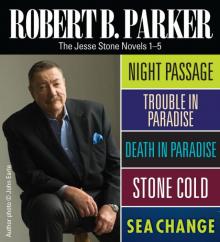 Robert B Parker: The Jesse Stone Novels 1-5
Robert B Parker: The Jesse Stone Novels 1-5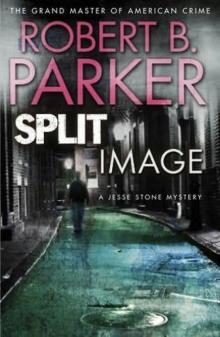 Split Image js-9
Split Image js-9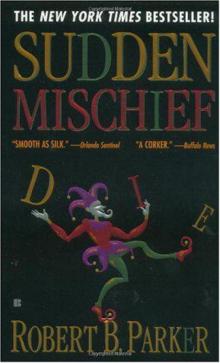 Sudden Mischief s-25
Sudden Mischief s-25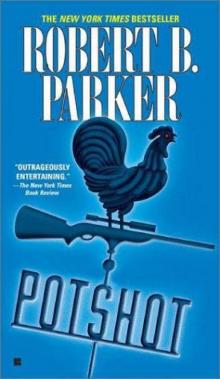 Potshot s-28
Potshot s-28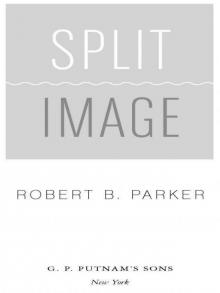 Split Image
Split Image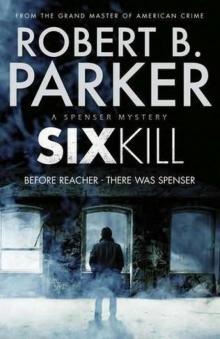 Sixkill s-40
Sixkill s-40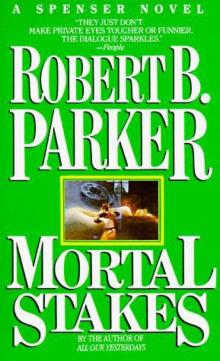 Mortal Stakes
Mortal Stakes Stardust
Stardust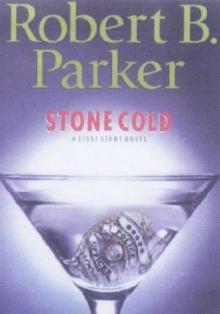 Stone Cold js-4
Stone Cold js-4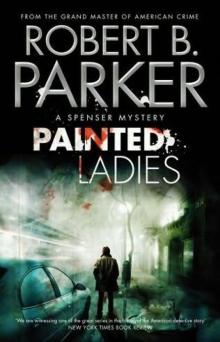 Painted Ladies s-39
Painted Ladies s-39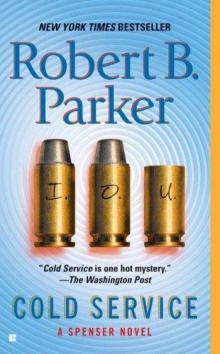 Cold Service
Cold Service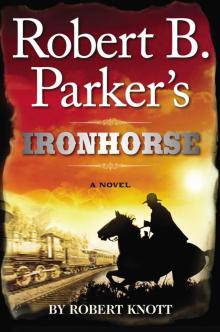 Ironhorse
Ironhorse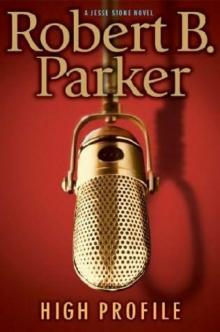 High Profile js-6
High Profile js-6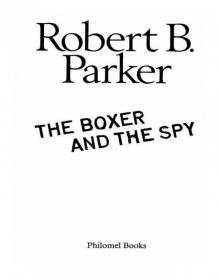 The Boxer and the Spy
The Boxer and the Spy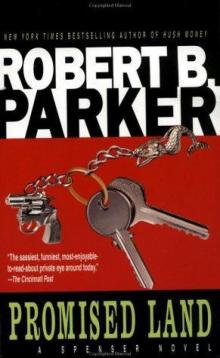 Promised Land s-4
Promised Land s-4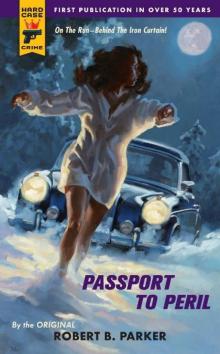 Passport to Peril (Hard Case Crime (Mass Market Paperback))
Passport to Peril (Hard Case Crime (Mass Market Paperback))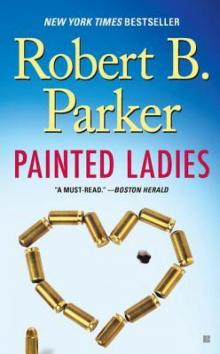 Painted Ladies
Painted Ladies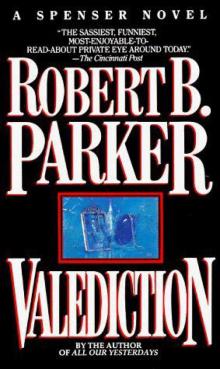 Valediction
Valediction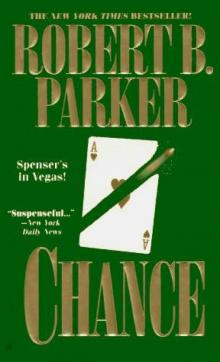 Chance s-23
Chance s-23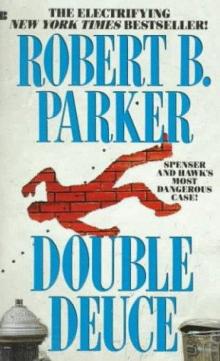 Double Deuce
Double Deuce Wilderness
Wilderness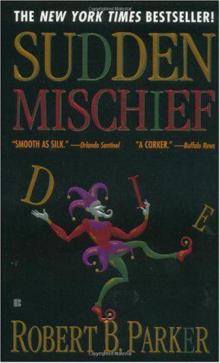 Sudden Mischief
Sudden Mischief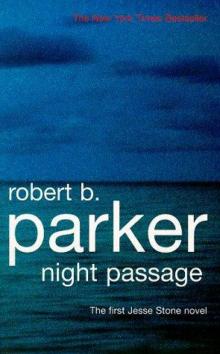 Night Passage js-1
Night Passage js-1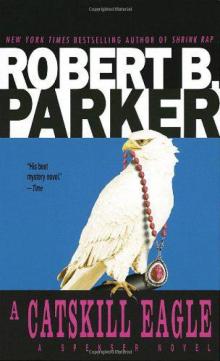 A Catskill Eagle
A Catskill Eagle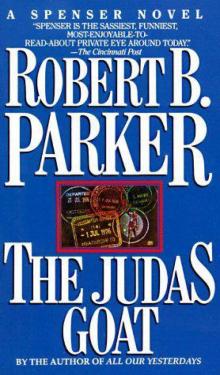 The Judas Goat
The Judas Goat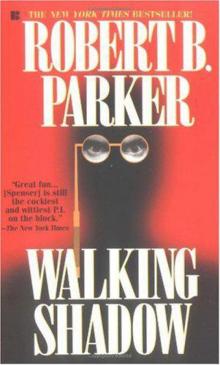 Walking Shadow
Walking Shadow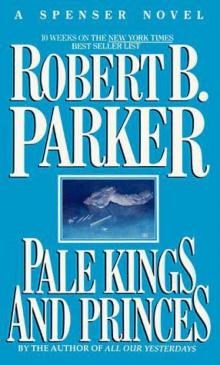 Pale Kings and Princes s-14
Pale Kings and Princes s-14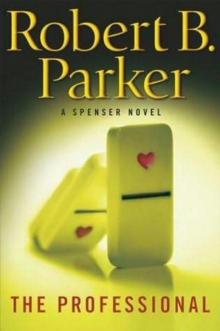 The Professional
The Professional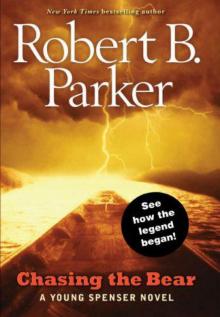 Chasing the Bear s-37
Chasing the Bear s-37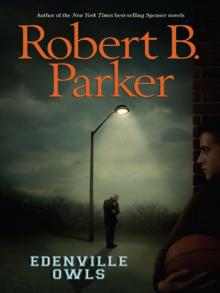 Edenville Owls
Edenville Owls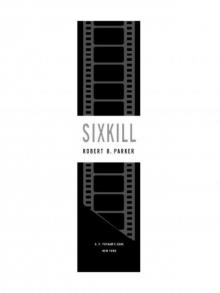 Sixkill
Sixkill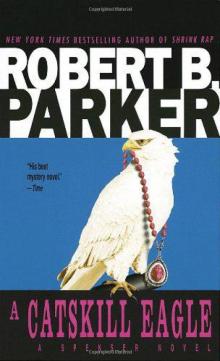 A Catskill Eagle s-12
A Catskill Eagle s-12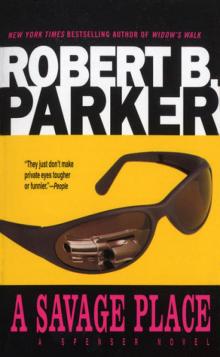 A Savage Place
A Savage Place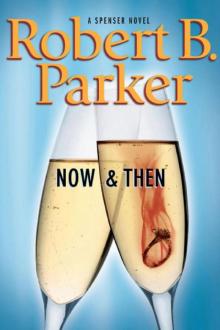 Now and Then s-35
Now and Then s-35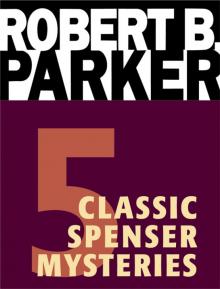 Five Classic Spenser Mysteries
Five Classic Spenser Mysteries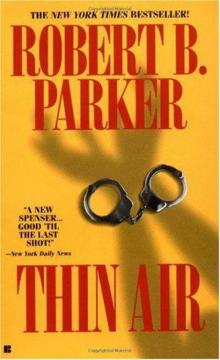 Thin Air s-22
Thin Air s-22